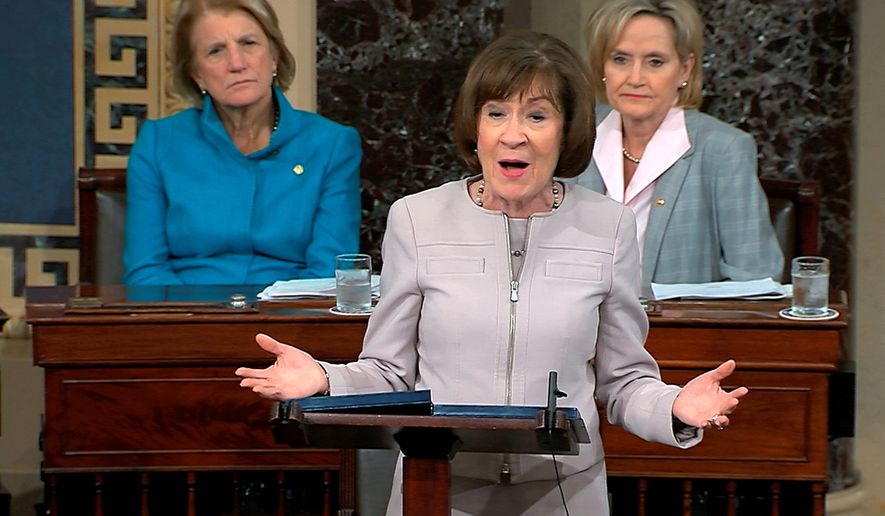Sen. Susan Collins’ opponents have already raised nearly $4 million to unseat her in 2020. Those in the know say it’s not going to be enough.
The Maine Republican drew the ire of liberals nationwide when she was pondering backing Justice Brett M. Kavanaugh’s confirmation to the Supreme Court. They turned to online crowdfunding, and the pledges rolled in, with organizers saying whichever Democrat wins the party’s nomination will collect the cash.
Democrat Cathleen London, a Milbridge, Maine, doctor who has announced plans to run against the incumbent, is eager to tap that fund, but she’s said she’s not under the illusion that will be enough to unseat a four-term incumbent.
“It’s going to be the minimum needed, because the last election — when she was a popular incumbent — she spent $6 million,” she told The Washington Times.
The effort by several liberal groups to raise the money was been popular, and controversial, from the start. It gave progressives an outlet for their anger over the Kavanaugh confirmation, and a target in Ms. Collins.
The deal was that if she voted against Justice Kavanaugh, the money would disappear back into donors’ pockets. If she voted for the justice, it would be funneled to her eventual opponent.
Ms. Collins said it amounted to an attempt at bribery, and while she hasn’t filed a legal challenge, her team is clearly taking stock of things.
“It was a quid pro quo,” said Annie Clark, a spokesperson for Ms. Collins.
“Anyone who thought this kind of tactic would work on Sen. Collins obviously doesn’t know her,” she added.
The anti-Collins campaign, launched on CrowdPac.com, was particularly popular among pro-choice activists who feared Justice Kavanaugh would vote to overturn the 1973 Roe v. Wade ruling.
A box of wire hangers was sent to Ms. Collins’ office and her staff faced an unprecedented level of threatening calls, including one caller who told a staffer he hoped someone would rape and impregnate her. That staffer has since quit.
Ms. Collins did end up backing Justice Kavanaugh and the crowdfunding campaign against her has continued to pull in pledges, with nearly $100,000 more added since the confirmation on Oct. 6. The overall goal is $4 million, and it stood at $3.75 million as of last week.
The groups did not return a request for comment.
After the Kavanaugh vote former Obama White House National Security Adviser Susan Rice took to Twitter to suggest she was interested in running, and analysts say plenty of others might take a look.
For now, the focus is on Ms. London, who is running her first-ever campaign.
“I am running, and starting early, because health care and the Supreme Court cannot wait until another full election cycle,” she said.
She has started her own crowdpac for the primary, raising slightly less than $3,000 on that platform so far.
Brian Duff, a political science professor at the University of New England, doubted the anti-Kavanaugh money would be decisive.
“I don’t think the money will make a difference in the sense of high-profile Senate races are just so bloody expensive now,” Mr. Duff said, pointing to the more than $93 million spent in the Texas race this year between Republican Sen. Ted Cruz and Democratic challenger Beto O’Rourke.
He said Ms. Collins’ vote for tax cuts could be a bigger factor in her fate if the economy has a downward turn.
He did not see any legal troubles for a Democrat using the crowdpac money against Ms. Collins.
But one a prominent conservative campaign lawyer has called for the Justice Department to investigate what she said was “definitely a violation of federal law.”
Ms. Collins, for her part, has stood by her vote for Justice Kavanaugh and recently said she was vindicated after he sided with the court majority — and against three other Republican-appointed justices — in refusing to revive an anti-Planned Parenthood law in Louisiana.
Speaking to Fox News last week, Ms. Collins said it would have been politically easier to vote against Justice Kavanaugh, as her fellow pro-choice Republican Sen. Lisa Murkowski did. But “that would not have been the right vote” for her.
“I want to be able to look in the mirror in the morning and know what I did was right no matter what the consequences may be. My job as a United States senator is to apply my best judgment and that is what I did in this case despite tremendous pressure,” she said.
• Alex Swoyer can be reached at aswoyer@washingtontimes.com.




Please read our comment policy before commenting.